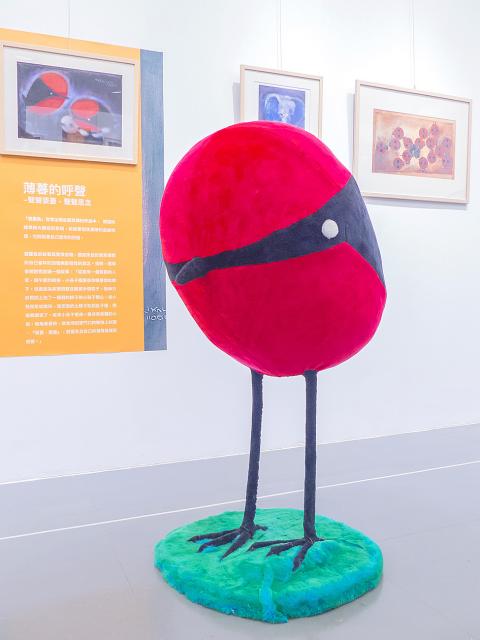More than 100 works by artist Max Liu (劉其偉) are being exhibited at the Art Center of Mingshin University of Science and Technology until June 5.
Cohosted by the Max Liu Culture and Art Foundation, the exhibition in Hsinchu County’s Xinfeng Township (新豐) features a range of Liu’s works, from self-portraits to paintings of the Po Yo Bird (婆憂鳥), Liu’s bird invention that is common in his work and based on a story told to him by his grandmother.
The exhibition is divided into themed sections: works featuring the Po Yo Bird, which evoke Liu’s memories of his grandmother; works portraying interactions between mothers and children; works rendering sex as a continuation of life; and later works, which illustrate ecological conservation and animal protection.

Photo courtesy of the Minghsin University of Science and Technology
A Po Yo Bird sculpture is also on display.
As an artist, Liu was young at heart and filled with a passion and longing for adventure, center director Lucky Lu (呂盈蓉) said.
He worked as engineer, author, painter, explorer and cultural anthropologist, she said.
Liu lived through a family bankruptcy, World War II, the Vietnam War and other misfortunes, she said, adding that having worked most of his life as an engineer, he taught himself how to draw at age 38.
In his later years, Liu conducted anthropology studies of rural tribes, the center said.
Liu was a prolific writer, as well as an advocate of ecological conservation, it added.
The foundation has since 2011 organized a touring exhibition of Liu’s works that has visited school campuses.
The exhibition’s opening ceremony on Wednesday last week was attended by Chen Kuo-kuan (陳國寬) of the foundation; Liu’s grandchildren Liu Yi-sun (劉怡孫) and Liu Ssu-tsen (劉思岑); and Liu’s granddaughter-in-law Wang Yung-yuan (王永元).
At the ceremony, College of Humanities and Social Sciences dean Liu Chung-chih (劉崇治) presented the foundation with a certificate of appreciation. Liu Ssu-tsen gifted a work by her grandfather to the center.
The exhibition is free and open to the public.

Beijing could eventually see a full amphibious invasion of Taiwan as the only "prudent" way to bring about unification, the US Department of Defense said in a newly released annual report to Congress. The Pentagon's "Annual Report to Congress: Military and Security Developments Involving the People's Republic of China 2025," was in many ways similar to last year’s report but reorganized the analysis of the options China has to take over Taiwan. Generally, according to the report, Chinese leaders view the People's Liberation Army's (PLA) capabilities for a Taiwan campaign as improving, but they remain uncertain about its readiness to successfully seize

Taiwan is getting a day off on Christmas for the first time in 25 years. The change comes after opposition parties passed a law earlier this year to add or restore five public holidays, including Constitution Day, which falls on today, Dec. 25. The day marks the 1947 adoption of the constitution of the Republic of China, as the government in Taipei is formally known. Back then the Chinese Nationalist Party (KMT) governed China from Nanjing. When the KMT, now an opposition party in Taiwan, passed the legislation on holidays, it said that they would help “commemorate the history of national development.” That

Trips for more than 100,000 international and domestic air travelers could be disrupted as China launches a military exercise around Taiwan today, Taiwan’s Civil Aviation Administration (CAA) said yesterday. The exercise could affect nearly 900 flights scheduled to enter the Taipei Flight Information Region (FIR) during the exercise window, it added. A notice issued by the Chinese Civil Aviation Administration showed there would be seven temporary zones around the Taiwan Strait which would be used for live-fire exercises, lasting from 8am to 6pm today. All aircraft are prohibited from entering during exercise, it says. Taipei FIR has 14 international air routes and

Snow fell on Yushan (Jade Mountain, 玉山) yesterday morning as a continental cold air mass sent temperatures below freezing on Taiwan’s tallest peak, the Central Weather Administration (CWA) said. Snowflakes were seen on Yushan’s north peak from 6:28am to 6:38am, but they did not fully cover the ground and no accumulation was recorded, the CWA said. As of 7:42am, the lowest temperature recorded across Taiwan was minus-5.5°C at Yushan’s Fengkou observatory and minus-4.7°C at the Yushan observatory, CWA data showed. On Hehuanshan (合歡山) in Nantou County, a low of 1.3°C was recorded at 6:39pm, when ice pellets fell at Songsyue Lodge (松雪樓), a